Use The Food Stalker’s Calorie Calculator to find out how many calories you need per day to lose, gain, or maintain weight. It will calculate your calorie expenditure from your current weight, age, gender, and activity level, then tell you how many calories you should eat to lose weight:
After you get your daily calories, set up your free account with us to get serious about counting your calories!
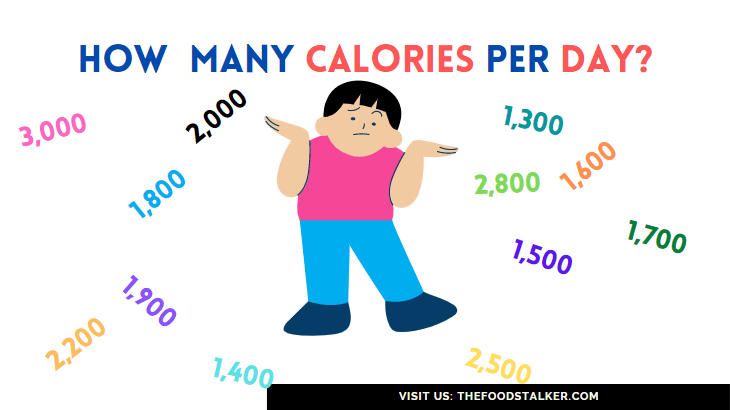
How Many Calories Per Day?
According to the U.S. Department of Agriculture’s (USDA’s) 2020 – 2025 Dietary Guidelines for Americans, most people require between 2,000 and 3,000 calories per day. This recommendation is not very useful if you are trying to change your current weight (unless you ordinarily eat far more than 3,000 calories in a day). The most convenient and accurate way to find out how many calories you need is to use The Food Stalker’s calorie calculator. Just enter your body weight, your age, gender, then choose an activity level and let the calculator work out your specific daily calories number.
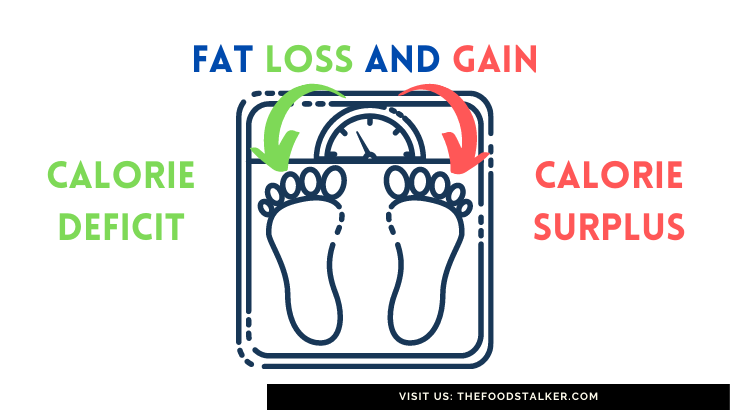
Fat Loss and Gain
Body fat is lost and gained in proportion to the difference between how much energy (calories) you eat and how much energy you use up. If you eat more calories than you use, your body will store some of the unused calories as fat. If you use more calories than you eat, the stored fat will be converted (“burned”) to make up the difference. Using more calories than you eat is the goal of all weight loss diets, meal plans, and systems. When you use more than you consume, you enter a calorie deficit situation.
How Many Calories for Breakfast, Lunch, and Dinner?
There are many competing ideas about how to spread your daily caloric intake through the day. Some experts believe that it is best to balance your nutrition evenly, whilst others encourage the practice of intermittent fasting. Say your daily calories target is 1,800 calories per day. You might eat 300 calories for breakfast, 500 calories for lunch, 800 calories for dinner, and have a 200-calorie snack. Alternatively, you could give breakfast a miss, then eat 800 calories for lunch and 1,000 calories for dinner. There may be benefits in following either option, but ultimately what counts over time is your daily calorie count.
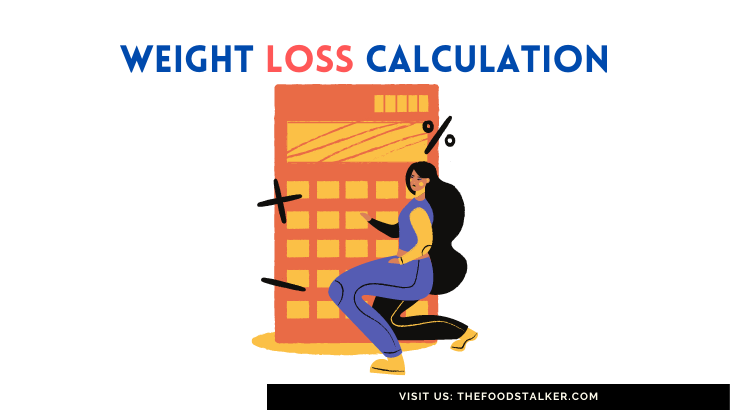
This is How our Calorie Calculator calculates your calories
How does a calorie calculator on the internet know how much food you should eat to lose weight? Well, it comes down to simple science:
First, BMR
Scientists have figured out a range of energy levels required to keep a human body alive and functioning at a basic level. They worked out that bigger bodies need more energy than smaller bodies, and bodies with more muscle need more energy than less muscular bodies, and younger bodies need more energy than older bodies. They wrapped all their knowledge into a mathematical formula, which can find out how much energy any body needs to survive at a basic level. This base energy is called the Basal Metabolic Rate (BMR). The Food Stalker Calorie Calculator uses the formula to first calculate your BMR, based on your inputs for weight, age, and gender.
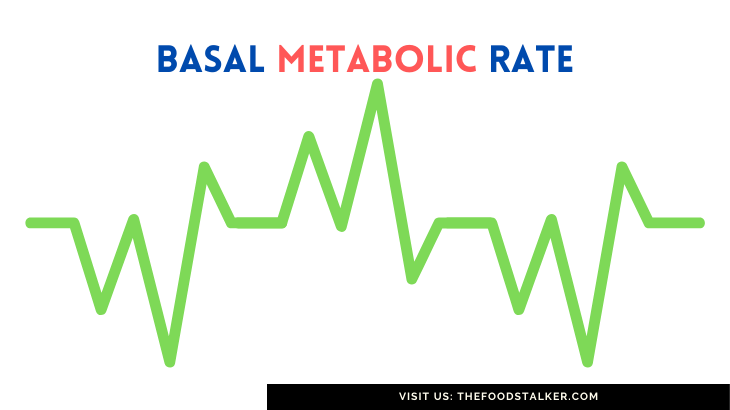
Then, TDEE
So BMR is the amount of energy, or calories, your body needs to stay alive. We know that your body is using that many calories, no matter what else is happening. It’s the energy your essential, unconsciously driven organs use all the time. But you’re not just laying prone in bed, not moving a muscle all day. You are doing things like reading The Food Stalker, driving your car, walking, and all sorts of other activities all the time. Even in sleep, you’re moving and dreaming. All these actions take energy which is added to your BMR. BMR plus energy used for activities is called your Total Daily Energy Expenditure (TDEE).
The Food Stalker’s Calorie Calculator factors in this extra energy based on what activity level you choose from the dropdown options. This allows it to calculate your TDEE and arrive at an accurate estimate of how many calories you need to sustain your current weight.
Finally, the Weight Loss Calculation
Ultimately, weight loss is governed by basic physics (the law of thermodynamics). The human body is a system with inputs and outputs. If you put a unit of energy into it, you cannot get more than a unit of energy out of it. If your body needs a unit of energy to survive and it does not get it, it will fail (die). To prevent death in the event of a lack of enough input energy, you body stores energy when it can (fat). If you want to force your body to use its stored energy, you need to give it less energy than it needs.
The Food Stalker’s Calorie Calculator uses a formula to work out how much weight (mostly fat) you will lose if you give your body fewer calories than it needs to keep its current size.
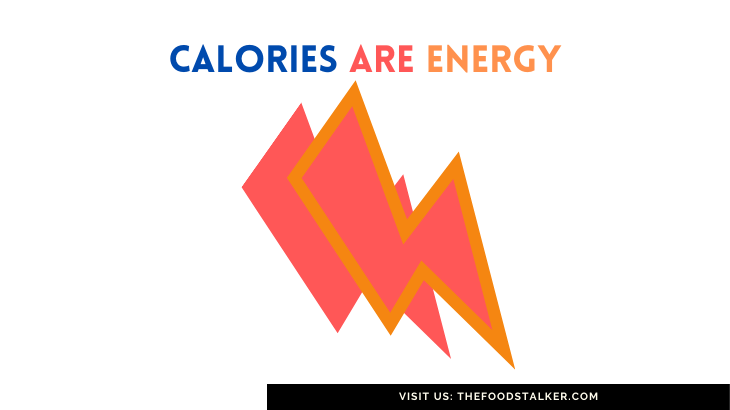
Wait, what are Calories anyway?
Rather than taking a massive deep dive into the intricacies of what calories are at the fundamental level, it is enough to explain what they are at a practical level for weight loss purposes. Calories are units of energy, in the same way that pounds are units of weight. There is no difference between a calorie in a cookie and a calorie in a lettuce leaf, provided that your body absorbs both. Calories are transmitted through space from the sun, absorbed into plant cells, and move through the food chain to arrive in your body. Calories are nothing more or less than energy. Energy is the stuff that makes things move. You can eat energy and you can use energy. If you use more energy than you eat, you will lose fat (stored calories).
Calorie Calculator Factors
So, as we’ve explained, calories and weight loss and weight gain have a simple and direct relationship. However, the relationship is affected by a range of factors which influence the speed of their interaction. If you just want to know how to lose a pound per week jump straight to The Food Stalker’s Calorie Deficit Calculator now. If you want to know why different people need different calories, read this:
Gender affects Caloric Requirements
Men have more muscle tissue than women in proportion to their body weight. This difference in body composition results in men needing more calories than women even when a man has the same weight as a woman. This is because muscle tissue uses more energy than other types of body tissue as the muscle cells move and exert force.
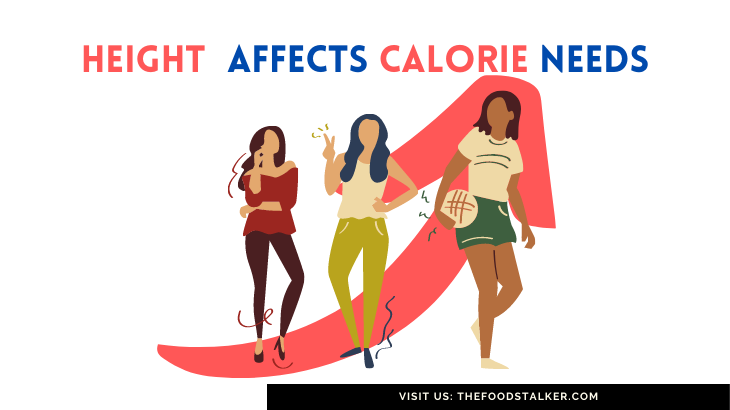
Height: Taller people need more calories
Height is an important factor in determining calorie requirements. Even when a taller and a shorter person have the same body weight, the taller person needs more calories than the shorter person to maintain their weight. This is because the taller person usually has more energy-intensive body tissues in proportion to those of the shorter person. The taller person’s body has a greater surface area with larger and longer muscles and internal organs.
Calorie needs reduce with Age
As we age, our metabolism slows as the cells in our body become less effective. This simple fact means that an older person needs fewer calories than a younger person even if both people have the same height, weight, and gender. Thus, age is a factor applied to the formula used in The Food Stalker’s Calorie Calculator.
Activity Level
It makes intuitive sense that people who are more active need more calories than people of the same age, height, gender, and weight who are less active. Simply put, activities require energy (calories) and more activity requires more energy. Whilst it is almost impossible to calculate precisely how much energy a certain person uses from day to day; formulae exist to draw accurate estimates based on statistical data. The calorie calculator applies a modifier for calories used on activities based on these activity levels:
Basal Metabolic Rate:
Select this activity level to find your BMR alone (not your TDEE, see above for explanation)
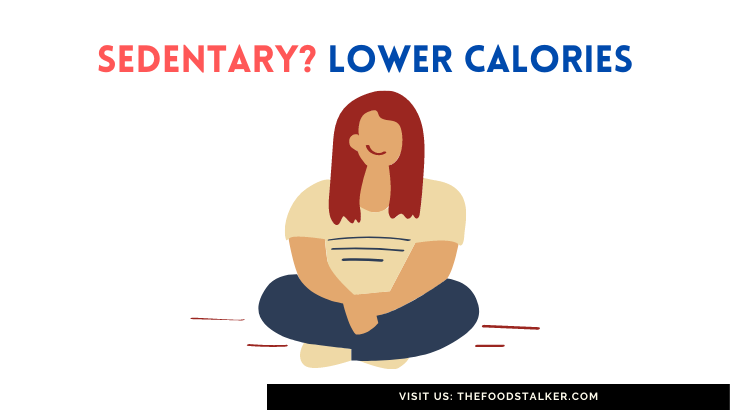
Sedentary
This activity level describes a person who does not get much exercise at all. Normal daily activities involve few physical activities like walking or lifting or working with the hands. Sedentary lifestyles do not incorporate regular exercise or physical exertion.
Lightly Active
Being lightly active means that you have a sedentary lifestyle with the addition of up to three meaningful exercise sessions per week. The exercise may be a brisk walk, a gym workout, or any activity that makes you breath fast or use conscious muscle effort to move or lift.
Moderately Active
A moderately active person is someone who leads a lightly active lifestyle (see above), with the addition of up to two more exercise sessions which involve real physical exertion. Somebody who is reasonably active for 5 days out of 7 can be said to be moderately active.
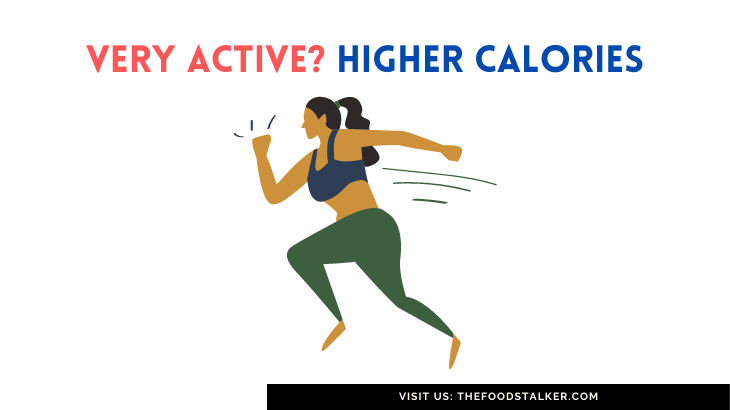
Very Active
If your occupation involves significant physical exertion or you work out at the gym or elsewhere for at least 6 days per week, you are very active. This level of activity is clearly more than moderately active, yet less than Extra Active. At this level, you will be losing your breath during exercise and/or straining your muscles almost every day.
Extra Active
Being in the extra active category means that you are training like an Olympian, or you are occupied as a lumberjack or in some such physically demanding role. You may be in the military, a professional athlete, or training for a marathon.
Hormones affect Calorie Requirements
Hormones are a factor which affect individual calorie requirements, but their effect cannot be properly accounted for by The Food Stalker Calorie Calculator or non-personalized weight-loss formula. The interplay between many hormones influences the rate of your metabolism, and thus your caloric requirements. Everyone’s hormones are different because no one has the exact same DNA and living environment. When it comes to losing weight, the most important thing to remember is that hormones are just a (small) contributing factor. Everyone who maintains a calorie deficit will lose weight.
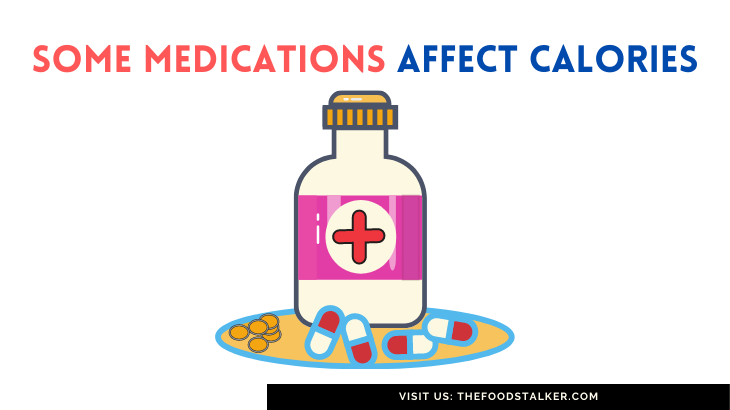
Certain Medications
Some medications, especially those prescribed specifically to treat metabolic conditions, can be a factor in determining your calorie needs. That’s one of the reasons The Food Stalker strongly encourages you to seek medical advice from a properly certified medical practitioner before making any drastic dietary changes.
How to Lose Weight
So, you want to lose weight? The good news is that you can, and all you need to do is take more energy out of your body than you put in. Eat fewer calories than you use. Reduce the amount of food you’re used to.
It can be very hard to do this, but there are many ways to make it easier. Here are some tried and tested methods which will get you to your goals faster:
Eat Low Calorie Foods
Some foods have lower calories than others, and if you eat these lower calorie foods instead of higher calorie foods, you will eat fewer calories. Of course, you need to eat about the same or less quantity (weight) of the substituted low-calorie foods as the forgone high calorie option. One of the main purposes of The Food Stalker is to let you know how the calories in this or that food compares to those in other foods, so that you can choose the lower calorie option.
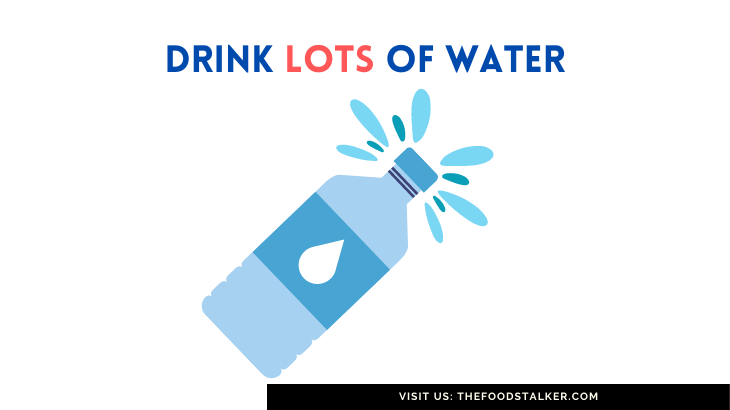
Drink more Water
Water is an under-appreciated weight-loss aid. Not only does it hydrate your body, quench your thirst, and help to fill your digestive system (thus reducing hunger), but it also discourages you from drinking sugary beverages. Sugar-laden sodas, juices, coffees, teas, and other drinks are a “hidden” source of calories that quickly ratchet up calorie intake without satisfying hunger much. Drinking lots of water is the best way to avoid liquid-borne calories.
Eat lots of Protein
There are many excellent reasons to eat lots of protein, but we’ll just consider one obvious one which promotes weight loss the most: protein satisfies hunger better. For whatever reason, built into our DNA, is the fact that most people feel fuller after eating protein-rich food. A 200-calorie steak will increase your satiety significantly more than a 200-calorie donut. When you are controlling how many calories you eat, it will be easier to do if your food keeps the hunger pangs away!
Exercise More
This might seem like a no-brainer but becoming more active will help you to lose weight faster. Now, bear in mind that every individual workout you do is not itself making a huge dent in your store of calories (fat), but the cumulative effect adds up. Probably the main benefit of more exercise (from a weight-loss perspective) is that your body starts to adapt to a more active lifestyle. The adaptation leads to a higher Basal Metabolic Rate (BMR) baseline, meaning that your metabolism speeds up. This means that you will use more calories all the time, even when you sleep!
Quick Note: There is a Minimum Recommended Calories Per Day
If you’ve read this far, you’re hopefully getting the idea that weight loss is always and everywhere the result of maintaining a calorie deficit. If you wanted to just go beast-mode and make an all-out effort to burn your fat stores in as fast a time as possible, couldn’t you just eat nothing, or just the bare minimum? If that’s where your thoughts are straying, please come back to the rational behavior side of life! Medical doctors will sometimes prescribe Very Low-Calorie Diets (VLCDs) on an individual, carefully assessed basis, but super-low-calorie plans are usually discouraged. VLCDs are often in the 800 calories per day range. However, most responsible nutrition professionals set a general minimum of 1,200 calories per day for most people.
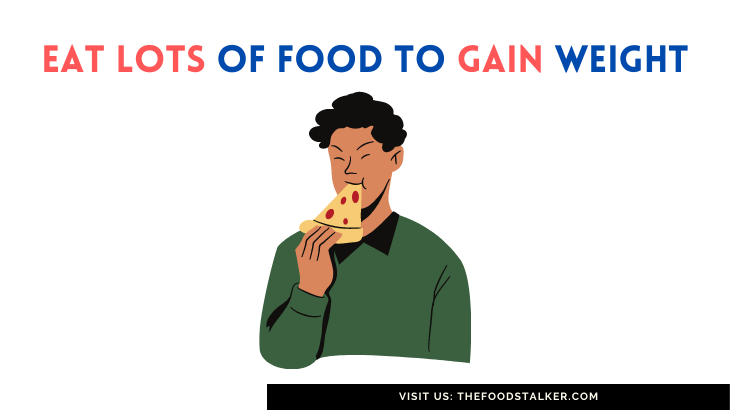
How to Gain Weight
Just as there is only one way to lose weight (use more calories than you eat), the only way to gain weight is to eat more calories than you use. Your body will keep some of the calories that are not needed by increasing the size and number of fat cells in your body. It is easier to eat more calories than you need if you choose calorie-dense foods rather than low-calorie alternatives. Starchy, creamy, oily, sugary, concentrated foods are usually much higher in calories than fibrous, dilute, watery, airy foods. Eating lots of high-calorie food often leads to a calorie surplus, which if sustained will surely cause weight gain.
How do Calories affect Muscle?
Muscle cells, like every other type of cell in your body, need energy (calories) to survive and thrive. To build muscle, a high protein calorie surplus is necessary. If you want to build muscle, you need to eat more calories than you use, so that the extra calories can power the growth of new muscle. Inevitably, some of the excess calories will be used to grow fat as well as muscle. It is not possible to grow muscle only, but it is possible (with the right type of exercise) to grow more muscle than fat. Professional bodybuilders alternate between gaining weight (gaining more muscle than fat) and losing weight (losing more fat than muscle) to sculpt their low fat, high muscle bodies.
This is how the Mayo Clinic explains it: